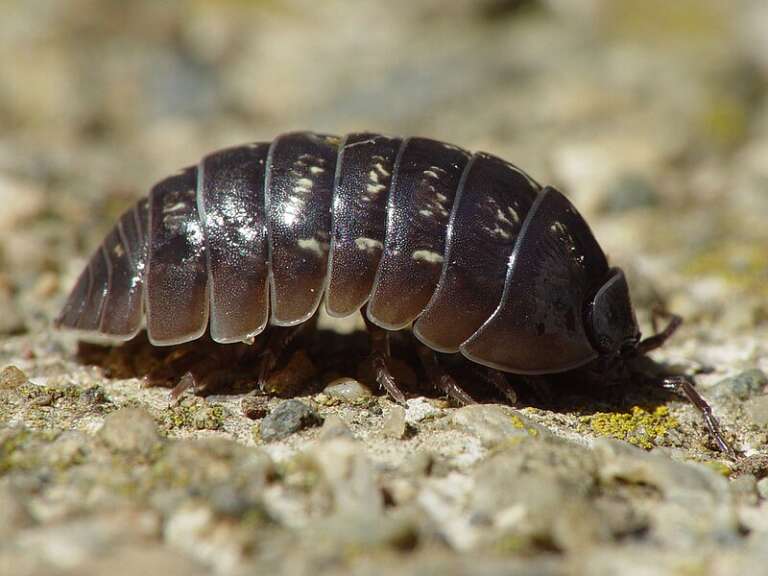Sow bugs, also known as pill bugs, primarily eat decaying plant material but can occasionally feed on young plants and fruits and vegetables that are on damp ground. They are beneficial recyclers in gardens but can become pests when they damage shoots, roots, and produce.
These garden critters resemble mini armadillos and thrive in areas with high moisture, remaining hidden under objects during the day. Sow bugs are harmless to humans and do not bite or sting, making them simply a nuisance. Natural predators of sow bugs include frogs, toads, newts, lizards, spiders, and small mammals.
Overall, sow bugs play an important role in the ecosystem by decomposing organic matter.
The Diet Of Sow Bugs
Are sow bugs good for your garden? Sowbugs and pillbugs are garden critters that look somewhat like mini armadillos. Feeding on decaying materials, they can be beneficial recyclers in gardens, but sometimes they become pests when they feed on young shoots and roots, or on fruits and vegetables that lie on damp ground.
What do sow bugs need to survive? Sowbugs and pillbugs are scavengers and feed mainly on decaying organic matter. They occasionally feed on young plants but the damage inflicted is seldom significant. Sowbugs and pillbugs thrive only in areas of high moisture, and tend to remain hidden under objects during the day.
Are sow bugs harmless? Besides living in the soil of houseplants, these pests cause little damage and do not cause harm indoors. In general, sowbugs are simply a nuisance, as they do not bite or sting and are harmless to humans.
What animals eat sow bugs? Natural predators include frogs, toads, newts, lizards, spiders, and small mammals. Sometimes, when they are still soft during molting, they can be eaten by their own kind.
Sow Bugs As Pests
Sowbugs and pillbugs, also known as woodlice or roly-polies, are small garden critters that resemble mini armadillos. These creatures primarily feed on decaying organic matter, making them beneficial recyclers in gardens. However, they can become pests when they start feeding on young shoots, roots, and fruits or vegetables on damp ground.
Managing Sow Bugs Naturally
|
Are sow bugs good for your garden? Pillbugs and sowbugs are garden critters that look somewhat like mini armadillos. Feeding on decaying materials, they can be beneficial recyclers in gardens, but sometimes they become pests when they feed on young shoots and roots, or on fruits and vegetables that lie on damp ground. |
|
What do sow bugs need to survive? Sowbugs and pillbugs are scavengers and feed mainly on decaying organic matter. They occasionally feed on young plants but the damage inflicted is seldom significant. Sowbugs and pillbugs thrive only in areas of high moisture, and tend to remain hidden under objects during the day. |
|
Are sow bugs harmless? Besides living in the soil of houseplants, these pests cause little damage and do not cause harm indoors. In general, sowbugs are simply a nuisance, as they do not bite or sting and are harmless to humans. |
|
What animals eat sow bugs? Natural predators include frogs, toads, newts, lizards, spiders, and small mammals. Sometimes, when they are still soft during molting, they can be eaten by their own kind. |

Credit: www.capradio.org
Frequently Asked Questions Of What Do Sow Bugs Eat
Are Sow Bugs Good For Your Garden?
Sowbugs in your garden can be beneficial as they help recycle decaying materials. However, they can become pests by feeding on young shoots, roots, and fruits on damp ground. Generally, sowbugs are harmless to humans and are a nuisance. They mainly feed on decaying organic matter and thrive in moist areas.
What Do Sow Bugs Need To Survive?
Sowbugs need decaying organic matter to survive. They are scavengers and mainly feed on decaying plant material. They can also occasionally feed on young plants, but the damage is usually minimal. Sowbugs thrive in moist environments and tend to hide during the day.
They are beneficial recyclers in gardens but can become pests when they feed on shoots, roots, fruits, or vegetables on damp ground.
Are Sow Bugs Harmless?
Sow bugs are harmless and do not cause harm to humans. They mainly feed on decaying organic matter and occasionally on young plants. They can be beneficial recyclers in gardens, but can also become pests when they feed on young shoots, roots, or fruits and vegetables on damp ground.
Natural predators include frogs, toads, lizards, spiders, and small mammals.
What Animals Eat Sow Bugs?
Sow bugs are eaten by frogs, toads, newts, lizards, spiders, and small mammals. Sometimes they can also be cannibalistic during molting.
Conclusion
Sow bugs, also known as pill bugs, are beneficial recyclers in gardens. Although they primarily feed on decaying organic matter, they can become pests when they feed on young shoots, roots, and damp fruits and vegetables. Sow bugs thrive in areas with high moisture and tend to hide during the day.
While they may occasionally cause some damage, they are generally harmless and do not bite or sting. Natural predators of sow bugs include frogs, lizards, and spiders. Overall, sow bugs play an important role in the ecosystem as decomposers of organic matter.

